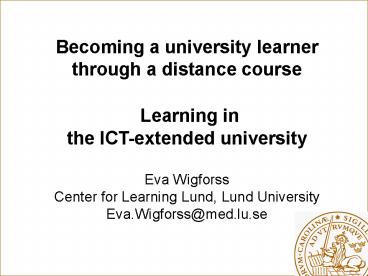Becoming a university learner through a distance course - PowerPoint PPT Presentation
1 / 9
Title:
Becoming a university learner through a distance course
Description:
Center for Learning Lund, Lund University. Eva.Wigforss_at_med.lu.se. Learning in the ... The project is financed by the Committee for Educational Science, Swedish ... – PowerPoint PPT presentation
Number of Views:19
Avg rating:3.0/5.0
Title: Becoming a university learner through a distance course
1
Becoming a university learner through a distance
course Learning in the ICT-extended
university Eva Wigforss Center for Learning
Lund, Lund University Eva.Wigforss_at_med.lu.se
2
Learning in the ICT-extended University - LiEU
- Learning in the ICT-Extended University
Experienced context and constituted meaning in
ICT-supported outreach initiatives involving
flexibility and diversity (Booth, 2003) - Research application to be seen at the project
homepage http//www.ll.lu.se/research/lieu/eng.htm
- The project is financed by the Committee for
Educational Science, Swedish Research Council
during 2004-2007
3
Research Objectives
- to analyze and describe learning in the sense
of constituting meaning from a variety of
experiences and potential paths as it is found
among the students of the courses we are studying
- to analyze and describe the context for learning
as it is experienced by individuals and groups
when course participation engages with their
personal educational histories and their current
situations
- to investigate the notions of flexibility and
diversity as they are built in and assumed by the
courses and the teachers, and as they influence
the experienced context and learning
- to bring the results of the individual studies
together, to compare and contrast the learning
afforded there, and to relate them to ICT-based
educational initiatives in a wider sense
- to turn the results into considerations of
pedagogical design and support
4
Conceptual framework
- A phenomenograhic research orientation
- The Engeström Triangles Activity system theory
5
Instruments
Object
Outcome
Subject
Division of labour
Community
Rules
6
Study guide, pbl tasks, web platform, audio
conferences, etc.
Cognitive physical
University learner
Student
Division of tasks and roles in the community
Study group (4), family, workplace
Deadlines, report format, etc.
7
Experiencing the activity
- Research question
- Method
- Preliminary results
- experiencing the course start
- experiencing the course assessment
- experiencing further academic studies
8
Conclusions
- The understanding of the university learning
context, as experienced by adult labour union
members with no previous academic background, is
the focus here.
- The study gives indications for what kind of
factors (instruments, rules, communities and
labour division) contribute to the experience of
becoming a learner in a distance learning
environment.
- It seems fruitful to use a combination of two
theoretical approaches to learning (activity
system theory and phenomenographic orientation)
to understand how to design a powerful university
learning context
9
Some references
- Marton, F. and Booth, S. (1997). Learning and
Awareness. Lawrence Erlbaum Associates - Engeström, Y. (1987). Learning by Expanding An
Activity-theoretical Approach to Developmental
Research. Helsinki Orienta-Konsultit Oy - Entwistle, N. and Peterson, E. R. (2005).
Conceptions of learning and knowledge in higher
education Relationships with study behaviour and
influences of learning environments.
International Journal of Educational Research,
41, pp 407428.





























![SYMBIOSIS International University – [SIU], Pune PowerPoint PPT Presentation](https://s3.amazonaws.com/images.powershow.com/9670429.th0.jpg?_=20211009126)

